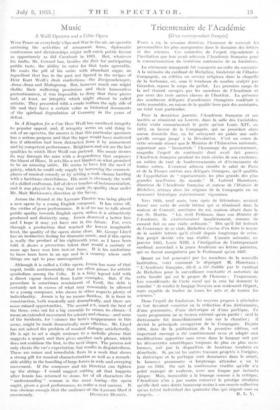Music
A Weill Operetta and a Celtic Opera
Wan peace on everybody's lips and War in the air, an operetta satirizing the activities of armament firms, diplomatic conferences and dictatorships might well catch public favour as opportunely as did' Cavalcade in 1931. But, whatever his faults; Mr. CoWard has, besides the flair for anticipating public taste, the ability to cater for that taste agreeably. He coats the pill of his satire with 'abundant Sugar, an ingredient that has in the past not figUred in the recipes of Herr Kurt Weill's drab confectionsthe. Dreigroschenoper, Anna-Anna and Mahagonny. But, however much one might dislike their wallOWing pessimism and their hurnourless pretentiousness, it was 'impossible to deny that these pieces had, at least; an integrity which Might almost be called artistic,' They presented With a crude-realism the Ugly side.of life and they have a certain value as historical docunients of the 'spiritual degradation of Germany in the years of defeat.
In A Kingdom for a Cater Herr Weill has .sacrificed integrity to pOpular appeal, and, if integrity seems an odd thing to ask of an,operetta, the answer is that this particular specimen has a serious purpose and that the, lapse would have mattered less if attention had been ,distracted..,from it by amusement and by competent performance. Brightness and wit are the last qualities,to which Herr Well can pretend. His music drones its way through the mire with a despondency that surpasses the bluest of Blues. It acts like a wet blanket on what promhed to be an amusing satire. He seems to have felt the need of gaiety, which he could only supply by borrowing the common- places 'of musical comedy, or by 'setting a male chorus bawling with a 'factitious cheerfulness. His score is obviously the work of a skilled craftsman, full of clever touches of instrumentation, and it was played in a way that made,its qUality clear under Mr. Muir 1111athicson's direction at the Savoy.
• Across the Strand at the Lyceum Theatre was being played a new opera by a young English composer. It has come off, the victim of poor performance. It is of no use to talk about public apathy, towards English opera, unless it is attractively produced and distinctly sung. Iernin deserved a better fate and I hope it may yet have one in the future. For, even through a production that reached the lowest imaginable level, the quality of the opera shone clear. Mr. George Lloyd has an instinctive feeling for dramatic music, and if this opera is really; the product of his eighteenth year, as I have been told, it shows a precocious talent that would a century or more ago have won him instant fame., It is his misfortune to have been born in an age and in a country where such things :are apt to pass unrecognized.
Although it is called a Celtic opera, lernin has none of that vapid, twilit sentimentality that too often passes for artistic symbolism among the Celts. It is a fairy legend told with a direct vigour derived from Latin examples. But, if the procedure is sometimes reminiscent of Verdi, the debt is certainly not in excess of what may reasonably be allowed to a young composer, who shows in other respects plenty of individuality. Iernin is by no means flawless. It is loose in construction, Loth musically and dramatically, and there are • some missed opportunities. .The second act, much the best of the three, cries out for a big ensemble to crown its climax—I mean an extended movement for soloists and chorus—and some of the incidents, for leistance the hero's reappearance in this scene, might be made dramatically more effective. Mr. Lloyd has not solved the problem of musical dialogue satisftietorny. He is apt to set a single sentence to ,a. melodic phrase that suggests a sequel, and then gives another such phrase, which does not continue the first, to the next singer. The process not only cheats the ear's expectation, but results in disjointedness. These are minor and remediable flaws in a work that shows a strong gift for musical characterization as well as a remark- able ability in the-handling of large forces in wide and sweeping movement. If the composer and his librettist can tighten up the strings-4 would suggest. cutting all that happens after Iernin has returned to stone, for of all characters the " understanding "? - woman -is the • most .boring—the opera ought, given a good performancei•to.make a-real success. It was obvious enough. that.'the audienceqrt the Lyceum liked it














































 Previous page
Previous page